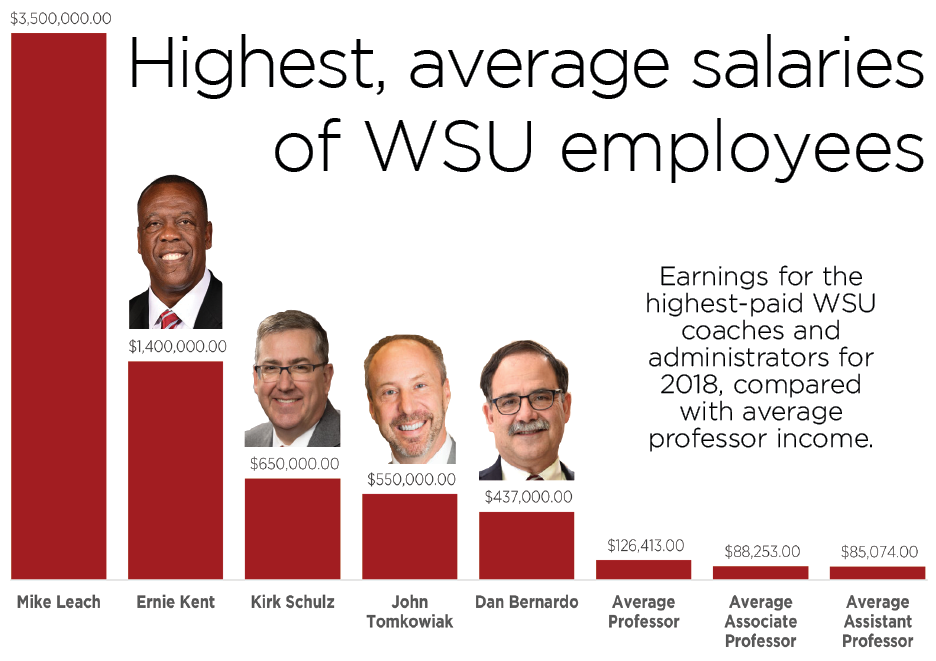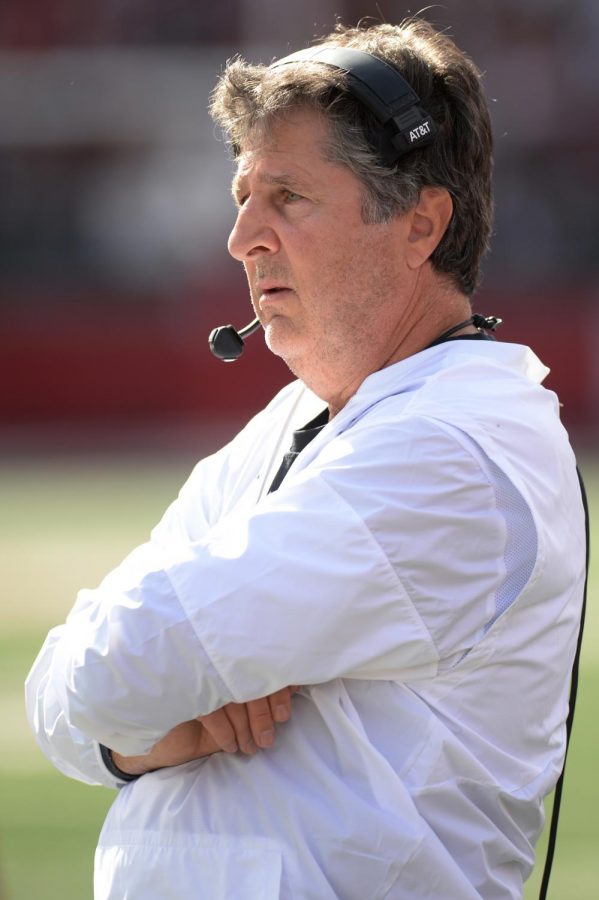High-ups earn six-figures
Contracts for coaches, admin often come with extensive benefits
ZACH RUBIO | Daily Evergreen File
With a projected salary of $3.5 million for the 2018 football season, Head Coach Mike Leach is the highest-paid university employee.
February 26, 2018
Editors Note: Clicking on the subheads before every section will open a new tab allowing readers to view the contracts in full.
Of the highest-earning employees at the university, football Head Coach Mike Leach, who is set to make $3.5 million in 2018, has seen some of the highest increases in pay. Last year he made 10 times more from media compensation — money he earns from public appearances — than what he originally negotiated in his 2011 contract with WSU.
The top six paid employees at WSU in 2017 — Mike Leach, basketball Head Coach Ernie Kent, former Defensive Coordinator Alex Grinch, Elson S. Floyd College of Medicine Dean John Tomkowiak, WSU President Kirk Schulz and Provost Dan Bernardo — are all administrators or athletics coaching staff who make over $400,000. Their employment contracts, obtained by public record request from The Daily Evergreen, show five of their six contracts include detailed fringe benefits, performance incentives and required commitments.
Chief Budget Officer Joan King said the budget office does not determine how much to pay employees. Instead, salaries are influenced by industry standards, and negotiations usually stay between the president and his executives or the athletic directors.
“You have to offer competitive salary and benefits if you want to hire somebody,” she said. “I think that’s what you see when you look at these contracts. They may look unusual compared to a contract for a new chancellor. But they’re not unusual if you compare them across the nation.”
Football Head Coach Mike Leach
Leach is the highest-paid employee at WSU and one of the top earners in the state, according to the state Office of Financial Management. His pay, broken down into media compensation, base salary, incentives and benefits, was re-negotiated throughout 2017.
When Leach first signed on with WSU in 2011, his agreed-upon base salary was $2 million. He was offered $100,000 for media compensation, $150,000 for supplementary product endorsement and up to $750,000 in performance-based incentives for making national rankings or winning bowl games or the Apple Cup, according to the records. During his last publicly available negotiation in August, he signed a deal with former Athletic Director Bill Moos that raised his media compensation, then $800,000, to $1.05 million, according to his contract.
After Moos left WSU in December, John Johnson, senior associate director and former interim director of athletics, said he negotiated another contract with Leach. That contract left his base pay at $2 million and again changed his media compensation and offered him a $250,000 increase annually until his contract expires in 2020, bringing his total pay to $4 million that year. In addition, he will receive a retention bonus of $750,000 in 2020.
Outside of monetary compensation, Leach receives benefits such as two courtesy cars from the university motor pool system, a membership to a country or health club, home and away game tickets, a Martin Stadium suite, first-class flights, travel expenses for himself and his family and some revenue from football camps, according to his contract.
Johnson said the athletics department’s goal when making contracts is to retain their coaches by negotiating appropriate benefits and compensation packages. He added that Leach’s compensation and benefits are standard throughout the industry and are warranted considering the exposure he brings WSU through both media appearances and the university’s use of his likeness.
University spokesperson Phil Weiler wrote in an email that athletic directors usually handle contracts exclusively. Although the president’s signature is on all the senior leadership’s contracts, he does not directly negotiate them.
While Leach is the highest-paid employee at WSU, he makes less than some of his counterparts at other Pac-12 programs. The Seattle Times reported that University of Washington football Head Coach Chris Petersen is set to make $4.9 million next season after making $3.6 million and an additional $1 million in performance-based bonuses last fall.
Basketball Head Coach Ernie Kent
Kent’s most recent negotiation extended his contract to 2022. During his original negotiations, Moos set his base salary at $1 million and compensated Kent $400,000 for all other “collateral opportunities.”
His fringe benefits included reimbursement for travel and out-of-pocket expenses, first-class upgrades for air accommodations, a health or country club membership, a vehicle, men’s basketball camp compensation, VIP tickets and parking spaces at games and compensation for athletics promotion activities. He is also eligible to receive about $700,000 in performance-based incentives for championship appearances and Coach of the Year awards.
Former Defensive Coordinator Alex Grinch
Grinch was set to make $600,000 for the 2017 season as defensive coordinator for the WSU football program before leaving for Ohio State in January. Johnson said he couldn’t speak to the new contract with Grinch’s replacement, Tracy Claeys, who joined WSU after being fired from his brief head coach position at University of Minnesota.
Outside of university benefits, he also received what Johnson described as standard athletic coaching staff benefits, including reimbursement for all travel and out-of-pocket expenses, parking and a university vehicle.
When the regents hired Schulz in June of 2016, they agreed to a five-year contract for $625,000 a year in addition to a $25,000-per-year retention incentive. He also may accept some outside compensation for consulting services or board of director responsibilities.
According to his contract, he has the option to serve in the Voiland College of Engineering and Architecture as a tenured faculty member. As a professor, he would receive compensation equal to the average of the three highest-paid full-time tenured professors upon the conclusion of his presidency in 2022 if his contract is not extended.
He receives standard university benefits, such as leave and health insurance, as well as the use of two vehicles and spousal travel accommodations, paid for by the President’s Excellence Fund. Other benefits include funds for hosting social and entertainment events on behalf of the university, the President’s Residence, where he lives in Pullman, and a second condominium in Seattle that he may use for university business.
In addition, he is reimbursed for expenses incurred during presidential duties and had his moving expenses covered when he came to WSU, according to the contracts.
Elson S. Floyd College of Medicine Dean John Tomkowiak
The inaugural dean of WSU’s new medical school, Tomkowiak signed his contract in 2015 for $500,000 per year. When the school received accreditation, his salary bumped to $550,000 a year. His benefits included relocation and travel expenses during the school’s early stages, according to his contract.
His contract allowed him to bring two administrators from his previous institution in Chicago to Spokane.
When Bernardo was offered the position of executive vice president and provost in 2014 by late WSU President Elson S. Floyd, he was compensated $350,000 annually with a $40,000 supplemental compensation payment, according to his contract.
Like Schulz, upon the completion of his appointment as provost he had the option to return to the School of Economic Sciences with a salary equal to the average of the three highest-paid full-time professors in the College of Agricultural, Human and Natural Resource Sciences.
When Floyd died in June 2015, Bernardo became the interim president. King said Bernardo received a bump in his salary then, but when Schulz became president he moved back to provost and was paid accordingly. In June 2016, Bernardo’s salary increased to $390,000 per year, and in April 2017 Schulz rolled Bernardo’s supplemental compensation into his regular salary, making his current compensation about $437,000 a year. No additional benefits are listed in his letters of appointment to the university.
Weiler wrote that Schulz is attempting to make compensation more transparent, which is why he is phasing out supplemental compensation from senior leadership. He said an example of that was with the new athletic director, Pat Chun, whose only extra incentive is tied to fundraising goals.
[pdf-embedder url=”https://dailyevergreen.com/wp-content/uploads/2018/04/18-10-Leach-Mike-Seventh-Amendment.pdf” title=”18-10 Leach, Mike Seventh Amendment”] [pdf-embedder url=”https://dailyevergreen.com/wp-content/uploads/2018/04/18-10-Leach-Mike-Sixth-Amendment.pdf” title=”18-10 Leach, Mike Sixth Amendment”]
[pdf-embedder url=”https://dailyevergreen.com/wp-content/uploads/2018/02/18-10-Athletics-No-redactions.pdf” title=”Mike Leach contract”]
















